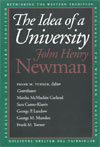
This is what I am afraid will happen with the advent of online classes:
"Knowledge... never will issue from the most strenuous efforts of a set of teachers, with no mutual sympathies and no intercommunication, of a set of examiners with no opinions which they dare profess, and with no common principles, who are teaching or questioning a set of youths who do not know the, and do not know each other, on a large number of subjects, different in kind, and connected by no wide philosophy, three times a week, or three times a year, or once in three years, in chill lecture rooms or on a pompous anniversary." VI.9
I have already seen this in public schools. I have seen this even in private institutions where this very passage is spoken as a warning. I feel toward this phenomenon as I do toward frostbite or gangrene; I want to believe that there is a way to heal the faulty part, but in moments of despair I feel that all there is to do is sever the infected limb.
This can't happen with the education system. With the rapid development of more and more affordable and streamlined online university classes, students are buying into the idea of remote education requiring little personal effort outside compulsory biweekly posts on the course website. But if this system, built for our comfort and wallets, turns into input-output accreditation with no fostering of intellect, we will have no gentlemen.
I'm not talking about coat-tails and opening doors. Newman presents a very detailed picture of the gentleman, or the man who is "well to have a cultivated intellect, a delicate taste, a candid, equitable, dispassionate mind, a noble and courteous bearing in the conduct of life--" (V.9) Still sound stuffy? The gentleman is pretty much the person who loves those around him best. If you need more clarification than that, I highly recommend you pick up the book.
My question for Newman is this: if it is best for every man to be a gentleman for the well-being of his soul, shouldn't all people attend University? And if that were the case, who would be doing all the skilled and unskilled labor to make our world go round? As the granddaughter of a blue-collar man, I believe in the power of the laboring gentleman, but education seems to be an integral part of Newman's equation. That's further complicated by the fact that he was writing in Ireland at a time when work was scarce and families were starving. Why at such a time would Newman push for a return to the university education of the gentleman? I certainly find the arguments within the book compelling now, but the historical context of this book problematizes the message for me.
Newman has me convinced: university education is constantly in danger of falling into pedantry or worse. We must be diligent teachers and students so that intellect is being fostered in the proper environment and to proper ends. But Newman hasn't quite convinced me that at a time when Ireland's people were dying by the thousands, a good university education was what the doctor ordered.
No comments:
Post a Comment